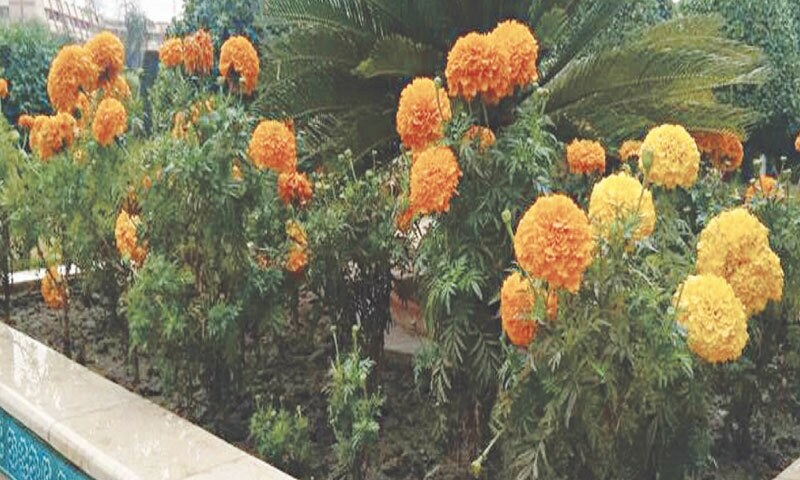By Dr Khwaja Ali Shahid Israel Becomes Muay
One may come across a number of quotes stating that one cannot reach the pinnacle, or even achieve basic results, without pain and sacrifice. As innocuous as it may seem, even kitchen gardening has its own share of sacrifices, ranging from infections to injuries and more. In this column, we list down potential medical complications that one may come across while trying to make the environment green, serene and beautiful, along with their safety measures and probable remedies.
One very common injury suffered by new gardeners, which also makes an interesting question in medical exams, is de Quervain’s tenosynovitis. The repetitive action of digging, pinching and pruning the plant or pulling the weeds can cause this injury. The impacted area of swelling and pain roughly lies at the wrist joint, between the base of the thumb and the index finger.
The repetition of gardening manoeuvres can result not only in de Quervain’s tenosynovitis, but also issues such as lateral epicondylitis (tennis elbow) and carpal tunnel syndrome. A tennis elbow results in pain and tenderness on the outside of the elbow, often extending into the forearm, while carpal tunnel syndrome impacts the nerve in the wrist. Both these complications can cause numbness and/or tingling in certain parts of the hand. Rest remains one of the best remedies to keep these problems under control.
I regularly suggest usage of grow-bags made of cloth or any fabric, instead of pots, for kitchen gardening. This is especially recommended for people who opt for rooftop gardening while residing in apartments or upper floors. Grow-bags are easier to carry and shift as compared to pots made of ceramic, cement or another material.
Gardening is therapeutic but it can also cause injuries — from cuts, sprains and infections to allergies. Here’s how to avoid them…
Sometimes, trying to drag and pull a big pot or tree trunk in the wrong posture can cause severe shoulder pain, lower back pain and potential muscular spasms. Similarly, carrying bags of fertilisers or soil overhead can also result in mild shoulder injury, neck pain and spasms. Mild over-the-counter painkillers, along with muscle relaxants, are usually recommended in such cases.
Bending at the hip joint, keeping your back straight while lifting such heavy objects and taking gaps in between the activity can go a long way in minimising the chances of occurrence of the above-mentioned issues.
For those suffering from chronic backaches, raised garden beds, plant hangings and growing succulents in cabinets or window sills would be relatively easy. In this scenario, it is much easier for gardeners to tend to their plants’ needs, from pruning to watering, without putting stress on their backs.
In hot and humid areas, keeping your hydration in check is fundamental. In rigorous manoeuvres such as digging and tilling the soil, excessive sweating can result in weakness and dehydration. Water breaks are handy in such conditions. One may also schedule such activities at dawn or later in the day, when sunlight is less intense.
Many gardening enthusiasts regularly get abrasions, small cuts and minor injuries, usually due to carelessness or poor handling of the plants. Abrasions are more common in the winter season, when the skin is dry. Wearing good-quality gardening gloves can protect one from getting thorn pricks or abrasions on the hand, especially while shifting or trimming any plant.
There is a fungal infection that spreads through such pricks and cuts, called the rose gardener’s disease. Known as sporotrichosis in the medical community, this infection enters the body while residing on different parts of the plants, especially on the thorns.
People who are allergic to pollen and hay can succumb to asthmatic conditions, while there are other respiratory issues that may also crop up. Byssinosis, more commonly known as cotton dust asthma, is a respiratory disease prevalent in cotton-producing countries. Its symptoms include coughing, tightness in the chest and shortness of breath after inhalation of cotton and flax.
Spores of tetanus, a disease which is now unheard of due to vaccines, are historically found in manure and soil. These spores may enter the body through any cuts and can be life-threatening. Finally, water accumulation over the soil surface and collected rainwater in drums, kept aside for watering later, can be an inviting abode for the birth of malaria- and dengue-causing vectors, the mosquitoes.
Adhering to safety protocols when performing gardening stints is necessary. It is better to take advice from seasoned gardeners regarding what to do and what not to do during gardening. It is highly recommended to first watch a clip or video of any manoeuvres — widely available on social media platforms — that you intend to carry out.
Persisting with good hygiene practices, especially after any gardening activity, is critical and definitely includes proper handwashing, while focussing on nails. Finally, wearing gloves, shoes, a cap, a full-sleeve shirt and even goggles can go a long way in preventing and protecting one from different unwanted injuries.
Please send your queries and emails to doctree101@hotmail.com. The writer is a physician and a host for the YouTube channel ‘DocTree Gardening’ promoting organic kitchen gardening
Published in Dawn, EOS, July 6th, 2025
